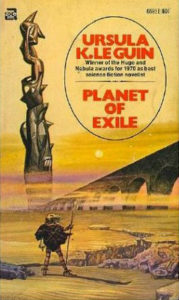Winter is coming. The orbit of the planet Werel gives it winters that last five thousand nights, give or take. Sound familiar? Well, Planet of Exile was published in 1966, four years before George R.R. Martin sold his first professional story.
As in Le Guin’s other Hainish stories, humans have been on Werel a very long time and have adapted to local conditions. The indigenous people, the Tevarans, have a low level of technology but have devised various strategies for coping with the winter. Nomadic, or semi-nomadic during the temperate seasons, they build up stores for the coming winter and construct mostly-underground dwellings where they can stay warmer and wait out the long cold season. Another group of indigenous people, the Gaal, relocate from the latitudes depicted in Planet of Exile to warmer climes where, presumably, they can survive without the elaborate preparations undertaken by the Tevarans. The Gaal are known as raiders. They pass through the Tevaran territory, taking what they can, but mostly they are in a hurry to move south, so it is not too difficult to fend them off.
A third group of people on Werel are the farborn, as the Tevarans call them, descendants of colonists who arrived on slower-than-light interstellar ships many generations ago. Operating under something like the Prime Directive, the settlers made minimal use of technology so as not to disturb the local societies any more than necessary. The colonists expected to assist the indigenous people as they acquired increasing levels of technology. The colonists also expected to be in periodic contact with the starfaring civilization that sent them forth. Unfortunately, neither of these happened, and they have gradually lost the technology that they came with; knowledge of the stars has largely retreated into legend by the time Planet of Exile begins. Nor can they interbreed with the local populace, and their numbers are dwindling slowly but steadily.
Planet of Exile tells of the season when all of those verities failed to hold. The Gaal have changed their tactics. Instead of raiding a bit as they pass through, they are moving more slowly but systematically razing or taking everything in their path. Traditional Tevaran methods will never hold them off. Rolery of Wold’s Kin, a young Tevaran woman out of place in her society, is rescued from certain death by Jakob Agat Alterra, a young farborn man, and a leader among them. Their first contact breaks taboos on both sides; the bond they forge will break more but prove crucial if their two peoples are to survive the conflict that is coming.
The book is only 100 pages, it might even count as a novella in today’s market, and yet it puts forward a coherent world, two and a half richly imagined human societies, and complex relationships among the people it introduces. Like many science fiction stories of its time, Planet of Exile posits telepathy as something that exists and could be developed in various forms, given the proper combination of talent and practice.
Le Guin’s background with anthropology is clearly visible: the Gaal and the impending winter provide the danger, but the real conflicts in the story arise from the clash of the worldviews of the farborn and the Tevarans. Their worldviews have allowed them to survive, but not they may very precisely stand in the way of survival. Like people everywhere, both groups are loathe to change fundamental ways of dealing with the world, even in the face of shattering evidence and opportunity to do things differently. Because Planet of Exile is not a tragedy or a dystopia, they do find partial means of reaching beyond what they have known, but not without substantial cost. In just her second novel, Le Guin is already reaching deeply into societies and people, without losing and of the narrative verve that lets her finish her tale in the time that a twenty-first century author might still just be warming up.

